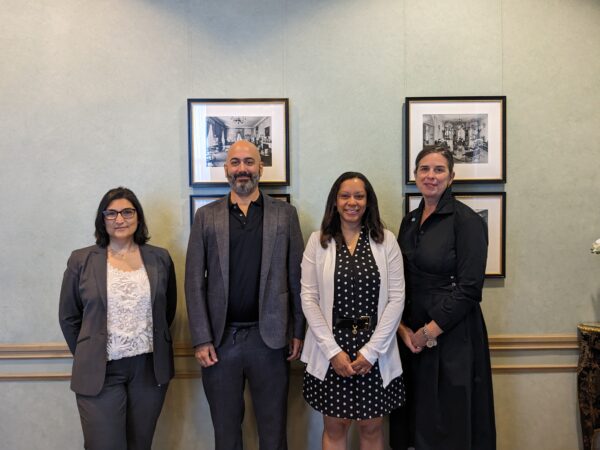Tech Envoy Series: From Vision to Reality: Advancing Future-Focused AI Policy on a Global Stage

Artificial intelligence (AI) has emerged as a transformative technology with immense potential. However, realizing its benefits while mitigating risks requires a comprehensive framework that fosters trust and guides effective risk management. This discussion was the third event in Meridian’s Tech Envoy series, which is supported by Intuit and AWS. Meg Poole, Director of Business Development and Partnerships for the Center for Global Leadership at Meridian, welcomed moderator Sultan Meghji, professor at Duke, Nykia Wilson, Director of Ethics at Intuit, and Elham Tabassi.
Ms. Tabassi is the Associate Director for Emerging Tech at Information Technology Laboratory, National Institute of Standards and Technology (NIST), at the U.S. Department of Commerce. She discussed the landscape of AI’s impact on society and unveiled the Artificial Intelligence Risk Management Framework, setting the stage for responsible and ethical AI implementation. Here are five main points from the program:
1) The Foundation of Trust
At the heart of the Framework lies the recognition that trust is essential in the safe adoption and evolution of AI. NIST affirms that AI is the most transformative technology of our time, and its Framework provides a horizontal understanding of artificial intelligence and its associated risks. By establishing a strong foundation of trust, governments, organizations, and individuals can embrace AI with confidence.
2) Measurability for Navigating a Fast-Changing Landscape
The pace of technological advancements demands flexibility in risk management strategies. The Framework acknowledges the need to adapt swiftly to evolving technologies, ensuring that risk management practices remain effective amidst constant change. To address this, NIST advocates for measurability, enabling stakeholders to quantify and improve trust in AI systems, providing a tangible basis for decision-making.
3) Risk Management: Maximizing Benefits while Minimizing Dangers
Effective risk management is paramount to harnessing the full potential of AI while minimizing associated dangers. NIST advocates for a rights-preserving, sociotechnical approach, which considers the social and ethical implications of AI applications. This approach recognizes the importance of context and emphasizes the need for flexible, agnostic risk management strategies that can be tailored to specific use cases.
4) Guiding Stakeholders with Playbooks
To assist organizations in implementing robust risk management practices, the Framework provides a comprehensive playbook. This resource offers descriptive guidance, actionable steps, and transparency, enabling stakeholders to navigate the complexities of AI implementation with clarity and confidence. By following the playbook, organizations can proactively address risks while building trust and accountability.
5) Regulatory Landscape and Harmonized Definitions
The rapid pace of AI’s evolution calls for a pressing need for clear specifications, standardized terminology, and workable definitions to facilitate effective regulation of the technology. Harmonizing global standards for safe AI is a priority, ensuring that safety measures are universally understood and implemented. NIST aims to work closely with stakeholders to establish scientific foundations, promote cooperation, and define safe AI consistently across borders. Recognizing that progress in AI is a collective endeavor, NIST emphasizes the importance of community engagement and collaboration, ensuring that diverse perspectives shape the future of AI.
This program is part of Meridian’s Tech Envoy Series, which enables discussion of the ways the public and private sectors can join forces with civil society around the world to tackle today’s greatest challenges through technology.
This program series was made possible through the support of:











Project summary
| Tech Envoy Series: From Vision to Reality: Advancing Future-Focused AI Policy on a Global Stage | July 2023 | |
|---|---|
| Regions: | Africa, East Asia and Pacific, Europe and Eurasia, Near East and North Africa, South and Central Asia, Western Hemisphere |
| Countries: | Canada, Ecuador, France, Cayman Islands, Netherlands, Paraguay, Argentina, Vietnam, Germany |
| Impact Areas: | Business and Trade, Civic Engagement, Entrepreneurship, Human and Civil Rights, Science and Technology, Security and Defense, Artificial Intelligence and Cybersecurity |
| Program Areas: | Diplomatic Engagement |
| Partners: | Private Sector |